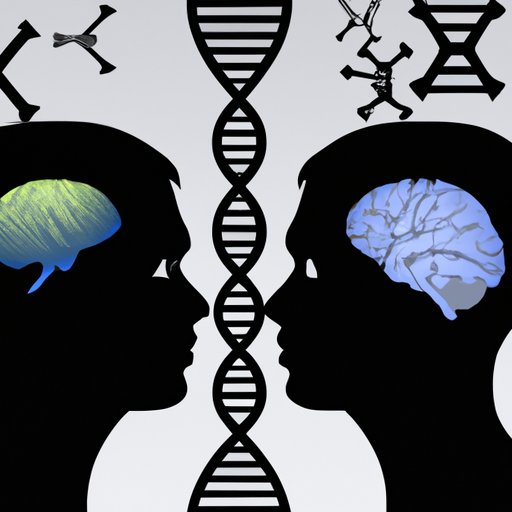Introduction
Mental health is a broad term that refers to an individual’s overall psychological wellbeing. It encompasses many aspects of life, including emotions, thoughts, behaviors, and relationships. Mental health has a significant impact on one’s ability to cope with stress, build meaningful relationships, and lead a productive life.
There are numerous factors that contribute to mental health. This article will explore the roles of genetics and biology, social factors, stress, diet and nutrition, and exercise in maintaining mental health.

Exploring the Role of Genetics and Biology in Mental Health
Genetics plays a major role in determining mental health. According to a study published in Translational Psychiatry, genetic factors account for approximately 40% of the risk for developing mental health conditions such as depression and anxiety. Additionally, research has indicated that specific genes may be linked to certain mental health disorders, including bipolar disorder, schizophrenia, and autism spectrum disorder.
Biological factors can also influence mental health. For example, hormones play a role in regulating mood and behavior. Imbalances in hormones such as cortisol, serotonin, and dopamine can lead to changes in mood and behavior. Additionally, physical illnesses such as cancer or chronic pain can have a negative impact on mental health.

Examining the Impact of Social Factors on Mental Health
Social factors can also affect mental health. A study published in The Lancet found that people with a larger social network had a lower risk of depression. The quality of social relationships is also important; individuals who feel supported by their social networks tend to have better mental health.
Discrimination can also have a negative impact on mental health. According to a study published in The American Journal of Public Health, discrimination is associated with an increased risk of depression, anxiety, and post-traumatic stress disorder.
Analyzing the Effects of Stress on Mental Health
Stress is another factor that can affect mental health. According to a study published in Psychological Science, long-term exposure to stress can lead to changes in brain structure and function that can increase the risk of developing mental health disorders. Additionally, short-term exposure to stress can lead to feelings of anxiety, depression, and irritability.
Investigating the Effects of Diet and Nutrition on Mental Health
Diet and nutrition also play a role in mental health. A study published in Neuroscience & Biobehavioral Reviews found that diets high in unhealthy foods such as processed meats and refined sugars can increase the risk of developing depression and anxiety. Additionally, diets low in essential nutrients such as omega-3 fatty acids, vitamin B12, and folate can also negatively impact mental health.

Investigating the Impact of Exercise on Mental Health
Exercise can also have a positive impact on mental health. According to a study published in JAMA Psychiatry, regular physical activity can reduce symptoms of depression, anxiety, and stress. Additionally, exercise can help to improve sleep quality, which is an important factor in maintaining mental health.
Conclusion
In conclusion, there are numerous factors that contribute to mental health, including genetics, biology, social factors, stress, diet and nutrition, and exercise. It is important to recognize the role that each of these factors plays in maintaining mental health and to take steps to support mental health, such as engaging in regular physical activity, eating a healthy diet, and building a supportive social network.
(Note: Is this article not meeting your expectations? Do you have knowledge or insights to share? Unlock new opportunities and expand your reach by joining our authors team. Click Registration to join us and share your expertise with our readers.)
